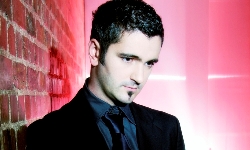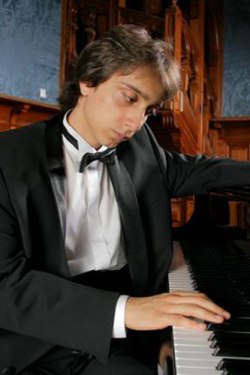Daniel Grimwood, Miroslav Kultyshev, Wigmore Hall | reviews, news & interviews
Daniel Grimwood, Miroslav Kultyshev, Wigmore Hall
Daniel Grimwood, Miroslav Kultyshev, Wigmore Hall
Cascades of notes and pianistic depths in two virtuoso piano recitals
 If Kultyshev was the one to scale the heights and plumb the depths, Grimwood (pictured right) certainly kept his head in a programme for which, as he put it, he could have done with sprouting an extra hand or two. He discovered the music of Felix Mikhailovich Blumenfeld leafing through the substantial collection of the late Richard Beattie Davis. A footnote in most books on Russian music, and a benign if reactionary pedagogic presence in the substantial diaries of the young Sergey Prokofiev, Blumenfeld almost swamps the substance of his later works with his virtuosic facility, though Grimwood kept a tight rein on the water-music of Op 38's six well-proportioned pieces.
If Kultyshev was the one to scale the heights and plumb the depths, Grimwood (pictured right) certainly kept his head in a programme for which, as he put it, he could have done with sprouting an extra hand or two. He discovered the music of Felix Mikhailovich Blumenfeld leafing through the substantial collection of the late Richard Beattie Davis. A footnote in most books on Russian music, and a benign if reactionary pedagogic presence in the substantial diaries of the young Sergey Prokofiev, Blumenfeld almost swamps the substance of his later works with his virtuosic facility, though Grimwood kept a tight rein on the water-music of Op 38's six well-proportioned pieces.
The real fascination came with one of the last works Blumenfeld must have completed - Grimwood's notes gave no dates, and the only monograph is a hard-to-find Russian pamphlet - before an untimely brain haemorrhage in 1909 ended his pianistic career at the age of 46 (he lived on for more than two decades, but even his distinguished conducting appearances had to be severely limited). The Sonata-Fantasia's first movement is a luxuriant jungle of notes in search of a memorable theme, its restless efflorescence fascinating in itself. The slow movement drifts more hauntingly after a clear and ringing start, withdrawing into surprise chords of Scriabinish irresolution (it came as no surprise to find later that Blumenfeld the conductor was an early champion of the messianic master's earlier symphonic works).
Grimwood's determination to focus on purely musical values was a virtue here; perhaps less so in Rachmaninov's delirious First Piano Sonata. It's not an early work - the composer was working on his Second Symphony in Dresden at the same time - but few pianists want to touch its forty-five minute ramble, and if there's emotional sense to be made of its Faustian programme, Grimwood didn't find it in his noble triumph over the notes.
 Perhaps it needed a pianist with the Russian school's sense of holy mission, of music as a sacred rite. We'd had that not long ago at the Wigmore Hall in the vasty deeps of Elisabeth Leonskaja's Chopin recital; now along came 24-year old Miroslav Kultyshev (left) with an equally long and taxing programme. No doubt Liszt's colossal B minor Sonata, whether there's another Faust legend behind it or not, gives the pianist a clearer notion of its metaphysical intent than Rachmaninov's rampage, but that doesn't make the transcendental technique and concentration it requires any easier. Kultyshev sat as if in prayer before finding the perfect tone for the first, isolated note, and ended in the same hallowed silence. In between the torrents were unleashed with all invisible organ stops duly pulled out at the cornerstone climaxes, little in the way of hazy overpedalled thunder, and seemingly effortless space given to the many visions of consolation. In these Kultyshev raised his expressive features heavenward in the manner of his older compatriot Nikolay Lugansky (with whose profoundly musical concentration he already seems to have much in common).
Perhaps it needed a pianist with the Russian school's sense of holy mission, of music as a sacred rite. We'd had that not long ago at the Wigmore Hall in the vasty deeps of Elisabeth Leonskaja's Chopin recital; now along came 24-year old Miroslav Kultyshev (left) with an equally long and taxing programme. No doubt Liszt's colossal B minor Sonata, whether there's another Faust legend behind it or not, gives the pianist a clearer notion of its metaphysical intent than Rachmaninov's rampage, but that doesn't make the transcendental technique and concentration it requires any easier. Kultyshev sat as if in prayer before finding the perfect tone for the first, isolated note, and ended in the same hallowed silence. In between the torrents were unleashed with all invisible organ stops duly pulled out at the cornerstone climaxes, little in the way of hazy overpedalled thunder, and seemingly effortless space given to the many visions of consolation. In these Kultyshev raised his expressive features heavenward in the manner of his older compatriot Nikolay Lugansky (with whose profoundly musical concentration he already seems to have much in common).
This was the unmistakeable summit of Kultyshev's programme, but many of us were even more awed by his decision to play all eighteen of Tchaikovsky's last set of piano pieces, composed only a few months before the composer's untimely death with no hint of mortality in store, only a rich alchemy of human love, quirkiness and vitality to draw upon. The character pieces' varying difficulty and lengths suggest they were never intended to be played as a sequence, and I've never encountered the phenomenon - all one hour and a quarter of it - in concert before. Yet the fact that they were written in fifteen spring days gives them more of a unity than, say, the Chopin waltzes and, in the creative hands of Kultyshev, an almost equal charm.
Tchaikovsky elaborates many of his refrains, but even when he doesn't, Kultyshev played with a dance rhythm or a songline so idiosyncratically that it hardly sounded like the same idea. Passionate virtuosity occasionally ran away with itself, as in the Scherzo-fantaisie, but there was no shortage of sparkling humour in the balletic variations, above all the scintillating 5/4 waltz (witty cousin of the ones in the Pathetique and The Sleeping Beauty). Drigo found an unnecessary home for several of these in the celebrated revival of Swan Lake, but Tchaikovsky would have turned in his grave to hear how ineptly they'd been orchestrated, and how inappropriately sited, in two cases, close to the tragic denouement.
More remarkably, Kultyshev found a depth in Tchaikovsky's last lyric reflections I hadn't suspected was there. The Berceuse bid to rival Chopin's hypnotic specimen, with surprising rhythmic twists, a harping on the minor third which almost morphed into Gershwin's famous piano prelude, and a coda of infinite variety - the Chopin touch again. The big slow movement, the Pas de deux of this divertissement, was unmistakeably the Meditation, which Kultyshev yoked to the bravura of the preceding Characteristic Dance, but the pianist also matched the composer's gift to be simple in the penultimate 'Distant Past'.
The result was as glowing as the Chopin etudes and waltz Kultyshev surmounted so buoyantly at the end of a long evening. One could hardly blame Grimwood two days earlier for closing with the spaciousness of Bach, a composer one imagines the Russian might play with his own special sense of fantasy; but Kultyshev is more than just a wise, strange head on young shoulders - he's still in love with the sheer physical possibilities of his pianism, and after such a thoughtful programme we were happy to indulge him.
Add comment
more Classical music
 Christian Pierre La Marca, Yaman Okur, St Martin-in-The-Fields review - engagingly subversive pairing falls short
A collaboration between a cellist and a breakdancer doesn't achieve lift off
Christian Pierre La Marca, Yaman Okur, St Martin-in-The-Fields review - engagingly subversive pairing falls short
A collaboration between a cellist and a breakdancer doesn't achieve lift off
 Ridout, Włoszczowska, Crawford, Lai, Posner, Wigmore Hall review - electrifying teamwork
High-voltage Mozart and Schoenberg, blended Brahms, in a fascinating programme
Ridout, Włoszczowska, Crawford, Lai, Posner, Wigmore Hall review - electrifying teamwork
High-voltage Mozart and Schoenberg, blended Brahms, in a fascinating programme
 Sabine Devieilhe, Mathieu Pordoy, Wigmore Hall review - enchantment in Mozart and Strauss
Leading French soprano shines beyond diva excess
Sabine Devieilhe, Mathieu Pordoy, Wigmore Hall review - enchantment in Mozart and Strauss
Leading French soprano shines beyond diva excess
 Špaček, BBC Philharmonic, Bihlmaier, Bridgewater Hall, Manchester review - three flavours of Vienna
Close attention, careful balancing, flowing phrasing and clear contrast
Špaček, BBC Philharmonic, Bihlmaier, Bridgewater Hall, Manchester review - three flavours of Vienna
Close attention, careful balancing, flowing phrasing and clear contrast
 Watts, BBC Symphony Orchestra and Chorus, Bignamini, Barbican review - blazing French masterpieces
Poulenc’s Gloria and Berlioz’s 'Symphonie fantastique' on fire
Watts, BBC Symphony Orchestra and Chorus, Bignamini, Barbican review - blazing French masterpieces
Poulenc’s Gloria and Berlioz’s 'Symphonie fantastique' on fire
 Bell, Perahia, ASMF Chamber Ensemble, Wigmore Hall review - joy in teamwork
A great pianist re-emerges in Schumann, but Beamish and Mendelssohn take the palm
Bell, Perahia, ASMF Chamber Ensemble, Wigmore Hall review - joy in teamwork
A great pianist re-emerges in Schumann, but Beamish and Mendelssohn take the palm
 First Persons: composers Colin Alexander and Héloïse Werner on fantasy in guided improvisation
On five new works allowing an element of freedom in the performance
First Persons: composers Colin Alexander and Héloïse Werner on fantasy in guided improvisation
On five new works allowing an element of freedom in the performance
 First Person: Leeds Lieder Festival director and pianist Joseph Middleton on a beloved organisation back from the brink
Arts Council funding restored after the blow of 2023, new paths are being forged
First Person: Leeds Lieder Festival director and pianist Joseph Middleton on a beloved organisation back from the brink
Arts Council funding restored after the blow of 2023, new paths are being forged
 Classical CDs: Nymphs, magots and buckgoats
Epic symphonies, popular music from 17th century London and an engrossing tribute to a great Spanish pianist
Classical CDs: Nymphs, magots and buckgoats
Epic symphonies, popular music from 17th century London and an engrossing tribute to a great Spanish pianist
 Sheku Kanneh-Mason, Philharmonia Chorus, RPO, Petrenko, RFH review - poetic cello, blazing chorus
Atmospheric Elgar and Weinberg, but Rachmaninov's 'The Bells' takes the palm
Sheku Kanneh-Mason, Philharmonia Chorus, RPO, Petrenko, RFH review - poetic cello, blazing chorus
Atmospheric Elgar and Weinberg, but Rachmaninov's 'The Bells' takes the palm
 Daphnis et Chloé, Tenebrae, LSO, Pappano, Barbican review - lighting up Ravel’s ‘choreographic symphony’
All details outstanding in the lavish canvas of a giant masterpiece
Daphnis et Chloé, Tenebrae, LSO, Pappano, Barbican review - lighting up Ravel’s ‘choreographic symphony’
All details outstanding in the lavish canvas of a giant masterpiece
 Goldscheider, Spence, Britten Sinfonia, Milton Court review - heroic evening songs and a jolly horn ramble
Direct, cheerful new concerto by Huw Watkins, but the programme didn’t quite cohere
Goldscheider, Spence, Britten Sinfonia, Milton Court review - heroic evening songs and a jolly horn ramble
Direct, cheerful new concerto by Huw Watkins, but the programme didn’t quite cohere

Comments
...
...
...
...
...